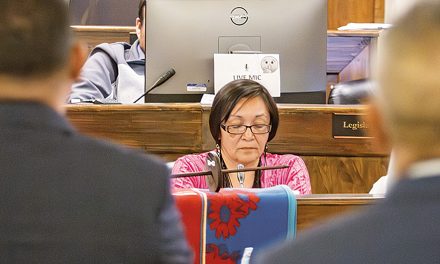
Letters: Stop messing with us
Diné lives matter and stop messing with us. Get serious and stop playing volleyball with the Diné people.
My patience ran low and decided to write again. It’s been eight months since the Navajo Nation received the CARES Act funds of $600 million-plus from the federal government and the Nation officials have been spinning their wheels. Remember, the Diné lives matter and stop playing with our lives.
The elected tribal officials have been going round and round with the CARES Act, particularly with the hardship funds, without real progress. The hardship fund was promised to be processed and paid out before Christmas and now it’s uncertain.
The other tribes are far ahead of us paying more than $2,500 to individual families. Was the application for the hardship funds even necessary? The federal stimulus funds payment made earlier this year didn’t require an application, so why are the Navajo hardship funds requiring an application?
The people are facing eviction and foreclosures like us living in the border town areas. Why does the tribal Council continue to play the old Indian tricks of the past decades?
It’s been taking them a couple of hours to make the mandated quorum to start their sessions and as soon as they finally make a quorum, they break for lunch break for another couple of hours. After lunch they take approximately one hour for discussion and it’s for them to pick up their stipend check for the day. How frustrating.
They need time management courses. In the meantime, while they’re at full speed playing volleyball, the hardship is worsening at an alarming rate among the Diné people.
I am wondering, did we elect tribal leaders that are mathematically insane or simply don’t know how to add or subtract? The way they are handling the CARES Act funds is a total shame.
They are making amendments after amendments of the hardship payments and making time extensions, which is poor management. Finally, I would like to wholeheartedly commend our courageous frontline workers for working around the clock and putting their lives for our safety. They deserve a lot of hardship funds for their families.
May the Lord shed light on you and protect you from harm. I urge the tribal leaders to start working diligently and efficiently for the Diné people instead of messing around. Limit your rendezvous hours in Gallup, and report for duty on time. Together we can defeat this monster called COVID-19. Happy holidays to my Diné people and pray for you a better year in the coming year.
Vern Charleston
Farmington, N.M.
A range of issues cause concern
Recent hemp/marijuana growing activities on our Navajo Nation has caused tremendous concern, worry, problems, and community dissension, especially along the San Juan River.
A designated Navajo Nation tribal liaison should have, by now, been named so we could call about ongoing problems with the hemp/marijuana farms.
Water pollution from the chemical pesticides and fertilizers must be measured from each farm and the effects on downstream users published. Identify all the chemical pesticides and fertilizers ASAP in a report from Navajo Nation Environmental Protection Agency. We owe it to all water users downstream. Are these chemicals carcinogenic? How much handling is dangerous? What kinds of HazMat precautions, at any of these recent growing sites, were taken, if any?
Victim identification from downwind exposure must be ascertained and notifications must be posted and education must be provided immediately. Jurisdictional issues must be clarified in regards to the recent laws passed by our Navajo Nation Council.
When the state of New Mexico starts looking at legalizing recreational marijuana they must consider the socio, economic, and spiritual impacts on Indian Country.
State should be providing more money for our law enforcement if our officers are expected to uphold laws, policies, and regulations of the state besides our own tribal laws. We have open borders and no way to enforce our laws on non-Indian lawbreakers, dope dealers, and other more heinous criminal activity. Our underfunded police department only has a handful of personnel who cover thousands of miles.
Growing and distribution has to be heavily regulated and kept off the Navajo Nation where it is illegal. Present distribution sites on the Navajo Nation, e.g. 7-11, and other retail establishments, must destroy their products or return for reimbursement.
A projected analysis must be forthcoming on what the state of New Mexico would be making if the recreational marijuana would become law. If the possible billions were to be made, how will it benefit the whole state?
New Mexico legislators must look at the whole state, including Indian Country. New Mexico state must provide money for substance abuse education, behavioral health programs in public schools, in regards to the health effects of recreational marijuana and hemp byproducts.
Drug-sniffing dogs and drug-testing kits should be readily available to all public schools in New Mexico. Legislation in regards to the location of marijuana stores/sales to not be within walking distance of schools have to be addressed.
The Hemp pilot project being conducted by the USDA/NMSU at NAPI, where is it and what happens next? Is the tribe working with the USDA to expand the project? Who is the tribal liaison and how much has the recent illegal hemp/marijuana growing activity on the Navajo Nation affected the pilot project’s viability and future plans? What are the plans?
We have a right to know. We cannot forget that Indian preference on Indian lands is the law and must enforce it.
Child labor and exploitation, we know that a child can work in a family business, but if not, we must investigate all reports of exploitation. The school has to be notified about any family business using their children under 16. Child abuse has no place in any society. Any kind of abuse and domestic violence is unacceptable.
Human trafficking is unacceptable! If ever hemp farming is adopted by the Navajo Nation, specific legal growing areas on Navajo Agriculture Products Industry has to be identified and monitored. Reports of illegal activity must be taken by Navajo Nation Police radio dispatch and information given immediately to the sergeants up the chain of command and actions taken. A designated liaison within the Navajo Nation with direct public access and contact must be named to deal with any future problems.
One of the concerns was that the radio dispatchers might inform “others” when a call comes in that might implicate the “others” so they can drive off the rez. We cannot eat hemp.
This Asian hemp plant uses a lot of water and apparently the growing of it requires chemical pesticides and fertilizers. We want to keep our crops organic as we have for hundreds of years. The GMO that NAPI was able to sneak onto the fields in past years was not fully explained nor was its planting ever given the blessings by the Navajo people.
We have farms where we traditionally grow corn varieties, squash, beans, potatoes, tomatoes, cucumbers, chilies, melons, herbs, cabbage, lettuce, asparagus, eggplant, pears, apples, peaches, apricots, cherries, blueberries, and other food plants. Our farms could be super developed using our hard-fought water rights.
These recently seized hoop houses can be re-purposed to grow winter crops and develop into spring plant starter places. We’d like information ASAP.
Another related problem is Missing Murdered Indigenous Women in our state and nationwide that has been talked about, but not enough funding has been allocated to investigate Native people who are missing and murdered. Unsolved cases must be followed up on, and funding allocated to victims and survivors.
Coordinated efforts must show trends towards success.
Our people are suffering from lack of water and electricity, unemployment, poor health, obesity, low birth rate, homelessness, substance addictions, high crime rates, poor roads, mental health issues, and environment/climate change.
These problems fuel domestic violence, the basis of all social ills. Substance abuse survivors depend on AA, NA, and Al-Anon for recovery and ongoing self-care.
If these programs don’t have meeting places in safe, well lit, and accessible buildings, they can be funded by the taxes from the recreational marijuana sales. Behavioral health programs that run self-help, homeless shelters, DOV shelters, and safe harbor should receive funds for all persons seeking help. Regional designations should be zoned for close proximity of these kinds of services.
Clients can have access through tele-health and if need be programs can purchase more minutes for clients’ phones. An interesting outcome of how fast the hemp/marijuana farms were put together is interesting. As a non-state-run program that got started, built and fully functional, and making possibly millions of dollars in such a short amount of time, is in itself a study in greed and self-interest.
Barbara J. Morgan
Shiprock, N.M.








 Highway 264,
Highway 264, I-40, WB @ Winslow
I-40, WB @ Winslow